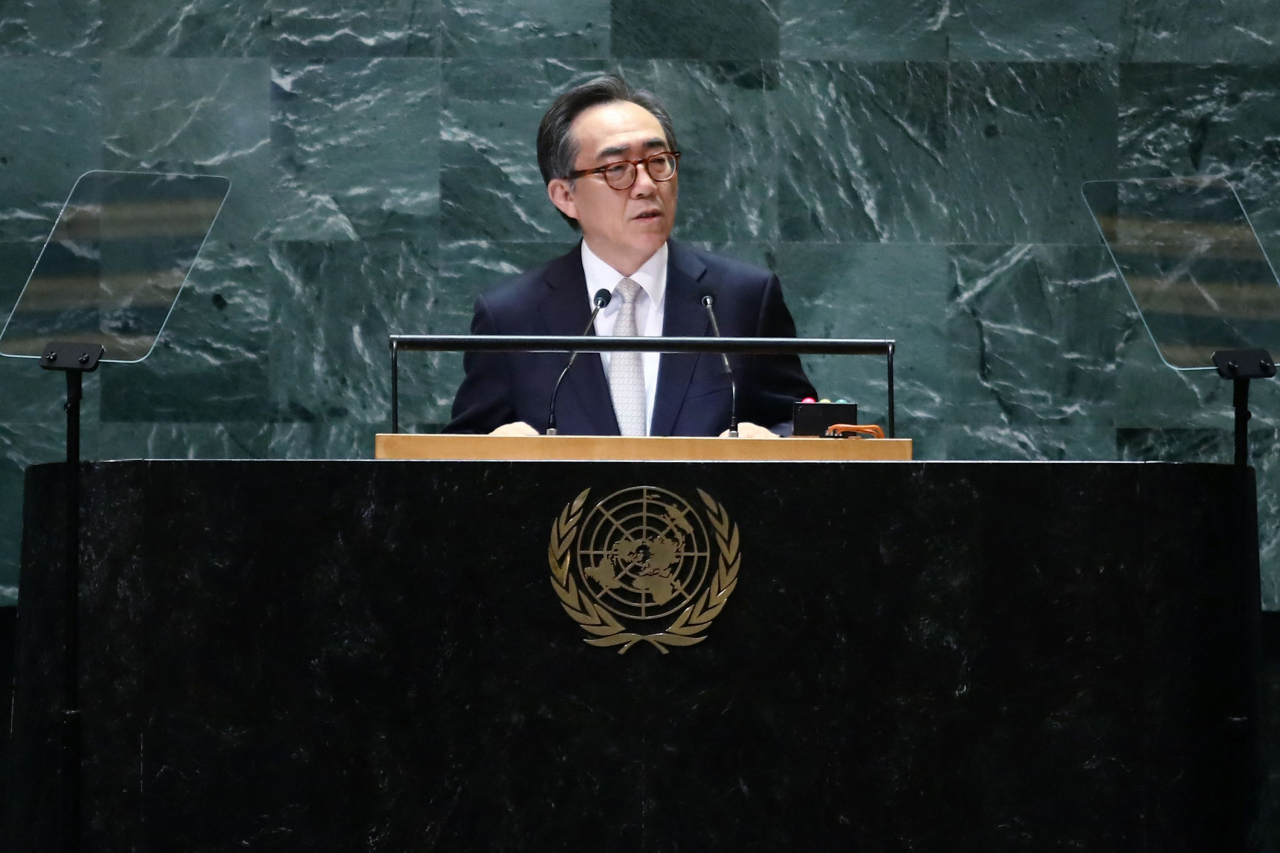 |
South Korea's Foreign Minister Cho Tae-yul speaks during the 79th Session of the United Nations General Assembly at the United Nations headquarters in New York City on Friday. (AFP-Yonhap) |
South Korea's foreign minister has made a strong case for multilateralism to address global challenges through international cooperation, stressing that it has undergirded his country's democratic and economic rise.
Foreign Minister Cho Tae-yul made the remarks at the UN General Assembly on Friday (New York time) as skepticism has deepened over the role of a deeply divided United Nations and other multilateral mechanisms in the midst of conflicts and humanitarian crises, including Russia's war in Ukraine and the war between Israel and Hamas militants in Gaza.
The minister also stressed South Korea's pursuit of a role as a "global pivotal state," pledging that Seoul will seek to act as a "facilitator," "supporter" and "initiator" for global peace, development and the charting of new norms and governance for new technologies like artificial intelligence.
"Under the foreign policy vision of President Yoon Suk Yeol, the Republic of Korea seeks to be a global pivotal state, recognizing both its indebtedness to the multilateral systems and its growing ability to be their champion," Cho said, referring to South Korea by its official name.
"The Republic of Korea is committed to do its part as a UN member by serving three functions -- a facilitator, a supporter and an initiator," he added.
Cho said that as a facilitator, South Korea will use its term as a nonpermanent member of the UN Security Council for the 2024-25 period to focus on peacekeeping and peacebuilding efforts, among others, while as a supporter, his country will seek to help the Global South achieve sustainable development goals.
As an initiator, Seoul will contribute to global efforts to install new norms and governance to address potential risks to human rights and dignity from AI and other emerging technologies, he said.
Brushing aside growing cynicism about multilateralism, Cho said that South Korea's rise as a "free, democratic and prosperous" country from the ashes of the 1950-53 Korean War is the proof that "the UN in action" works.
"The story of the Republic of Korea provides the antidote against paralyzing defeatism," he said. "It is a story of what we can achieve when good men and women choose to act together -- a concrete evidence that a multilateral system can make a real difference."
He also underscored that multilateralism is not an outdated concept but the "only path forward."
Cho used his speech to ask for the international community's support for Yoon's doctrine for a unified Korean Peninsula.
He portrayed the doctrine as pursuing a "free, peaceful and democratic" peninsula, while criticizing North Korea's "cold" and "self-serving" calculus marked by two deficits -- a deficit of peace on the peninsula and a deficit of freedom in North Korea.
"Under (Yoon's) vision, freedom, which has underpinned the Republic of Korea's independence, growth and prosperity, will at last be fully unlocked in the North, restoring the human rights of each and every Korean," he said.
"Achieving this vision requires the international community to advocate the freedom and human rights of North Koreans who have no voice. The Republic of Korea is committed to working together with the international community to steer North Korea towards making the right decisions."
The minister also lambasted North Korea over its nuclear and missile threats and its military cooperation with Russia.
"North Korea continues to pose threats to peace and security on the Korean Peninsula and beyond with its ongoing development of nuclear and missile capabilities, as shown by the recent disclosure of uranium enrichment facilities, as well as provocations that have stooped down to despicable levels, such as sending trash balloons into the South," he said.
Moreover, he reiterated that the North's nuclear and missile programs and its human rights situation are "two sides of the same coin."
"North Korea is only able to develop these weapons of mass destruction with impunity by repressing the human rights of its people and diverting scarce resources from its starving populace."
Touching on the reform of the UNSC, Cho said the council has faced deadlocks in handling important and urgent work due to the misuse of a permanent member's veto power, apparently pointing to Russia's veto to end the work of a sanctions-monitoring UN panel.
"Expanding elected membership under equitable geographical distribution and through regular elections will contribute to a more democratic, effective, transparent, representative and accountable Council. The compromise proposal of longer-term reelectable seats deserves due attention in this regard," he said. (Yonhap)








![[Herald Interview] How Gopizza got big in India](http://res.heraldm.com/phpwas/restmb_idxmake.php?idx=644&simg=/content/image/2024/11/20/20241120050057_0.jpg)

